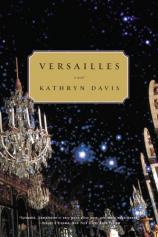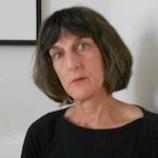Excerpt
Excerpt
Versailles: A Novel

Chapter 1
My soul is going on a trip. I want to talk about her. I want to talk about her. Why would anyone ever want to talk about anything else?
My soul is a girl: she is just like me. She is fourteen years old and has been promised in marriage to the French Dauphin, who also has a soul though more visible and worldly, its body already formed (so I've been told) from layers of flesh and fat. In France they piss into chamber pots made of lapis and dine on common garden slugs. In France their hands smell like vanilla and they shoot their flèches d'amour
indiscriminately in all directions, owing to their taste for books pernicious to religion and morals.
My soul is also powerful, but like a young girl it has wishes and ideas—yes!—a soul can have ideas like a mind does. "Antonia, Antonia, you must pay attention," I can still hear Abbé Vermond implore me, waving a book in my face when all I wanted to do was dance dance dance, as if he actually believed that to be light of heart is the same as being light of head.
We traveled in a carriage coated with glass and lined with pale blue satin, beautifully swift, magnificently sprung. The end of April and the clouds compact and quick-moving, the fields turning from pale to deeper green, and the fruit trees' veiled heads humming with bees. From Vienna to Molck, from the valley of the Danube to the Castle of Nymphenburg, whose inhabitants behaved like swine. Bells pealed all along our route and uniformed men shot off guns; little girls tossed flower petals in our path. The white horses of the Danube were here one minute, gone the next; one minute we slipped into the Black Forest's long cool shadows, the next out onto a hot sunny plain.
"The world where you must pass your life is but transitory," or so advised my papa from beyond the grave. "There is naught save eternity that is without end." In my lap I had my dear little pug, the smell of whose ears will always be sweeter to me than all the perfumes of Araby and the scent of heliotrope combined.
Twenty thousand horses stabled along the road from Vienna to Strasbourg—no sooner did one of our steeds begin to lather up and stumble than it was grount into cat meat and a new one found to take its place. Serving women, hairdressers, dressmakers, surgeons, furriers, chaplains, apothecaries, cooks. Each night we managed to consume 150 chickens, 270 pounds of beef, 220 pounds of veal, 55 pounds of bacon, 50 pigeons, 300 eggs.
I was eager to please, though that meant something other than acquiesce to another's desire. Pleasing meant my own desire: the place where my body and soul met, like the musician's bow bearing down on the string, teasing a sound out: ah ah ah ah ah!
My soul thought she'd be happy, and then, one day, she'd die.
But, die
.
What does this mean?
One day Antoinette will not exist, though her soul will continue to flourish.
And WHO IS THAT? WHAT IS THAT?
By the time we stopped for supper at the Abbey of Schuttern I had no appetite at all, even though the nuns tried tempting me with pilchards and apricots and kugelhopf; I admit I wept a little. It was the sixth of May; we'd been on the road for over two weeks. From my bedroom window I could see the Rhine, which looked wide and flat and the color of lead, and the light on it looked like the pilchards had, silver and skinny and unappetizing. I heard a door creak, the sound of footsteps. Angry voice arguing below, fighting over the wording in the marriage contract, by which I was to be deeded away like a cottage or a plot of land to the people of France. A fork of lightning over the Rhine, and the Lorelei's long ghostly arm lifting to meet it...
But Mama would never let me get away with such silly thoughts—I missed her so much I thought I'd die. "You must eat everything on your plate, Antonia. No picking and choosing. Why have you not eaten all your fish? How many times must I tell you that the child who gives into foolish fears will never amount to much as an adult. Come here, let me take a good look at you—" peering at me through a magnifying glass. "You seem so small for your age. How is your health?" Her white white hair and her white white teeth, one of which she'd had pulled while giving birth to me. Antoinette and a decayed molar, both of us rejected by my mother's body about eight o'clock in the evening, All Souls' Day, 1755.
It was getting dark; the moon was coming up over the river. At home Carlotta would be saying her prayers and Maxie sneaking cheese to his pet mouse, poor Anna lying there with her hands folded across her chest like an effigy of herself, unable to stop coughing. Joseph and Christina, Elizabeth and karl. Amalia, Leopold, Johanna, Josepha. Mama sitting in her private apartments, sipping her warm milk and signing state papers. Her head shorn and the walls draped in black ever since Papa's death, which she recorded in her prayer book, "Emperor Francis I, my husband, died on the 18th of August at half past nine o'clock. Our happy marriage lasted 29 years, six months and six days, 1,540 weeks, 10,781 days, 258,774 hours"—despite his numerous and humiliating infidelities.
At least I had my little pug with me, Gott sei dank!
Tomorrow I would stop speaking German forever, but not tonight. I could see where we were headed and it was black as pitch.
Excerpted from Versailles
© Copyright 2003 by Kathryn Davis. Reprinted with permission by Back Bay Books, an imprint of Time Warner Bookmark. All rights reserved.
Versailles: A Novel
- paperback: 240 pages
- Publisher: Back Bay Books
- ISBN-10: 0316737615
- ISBN-13: 9780316737616



